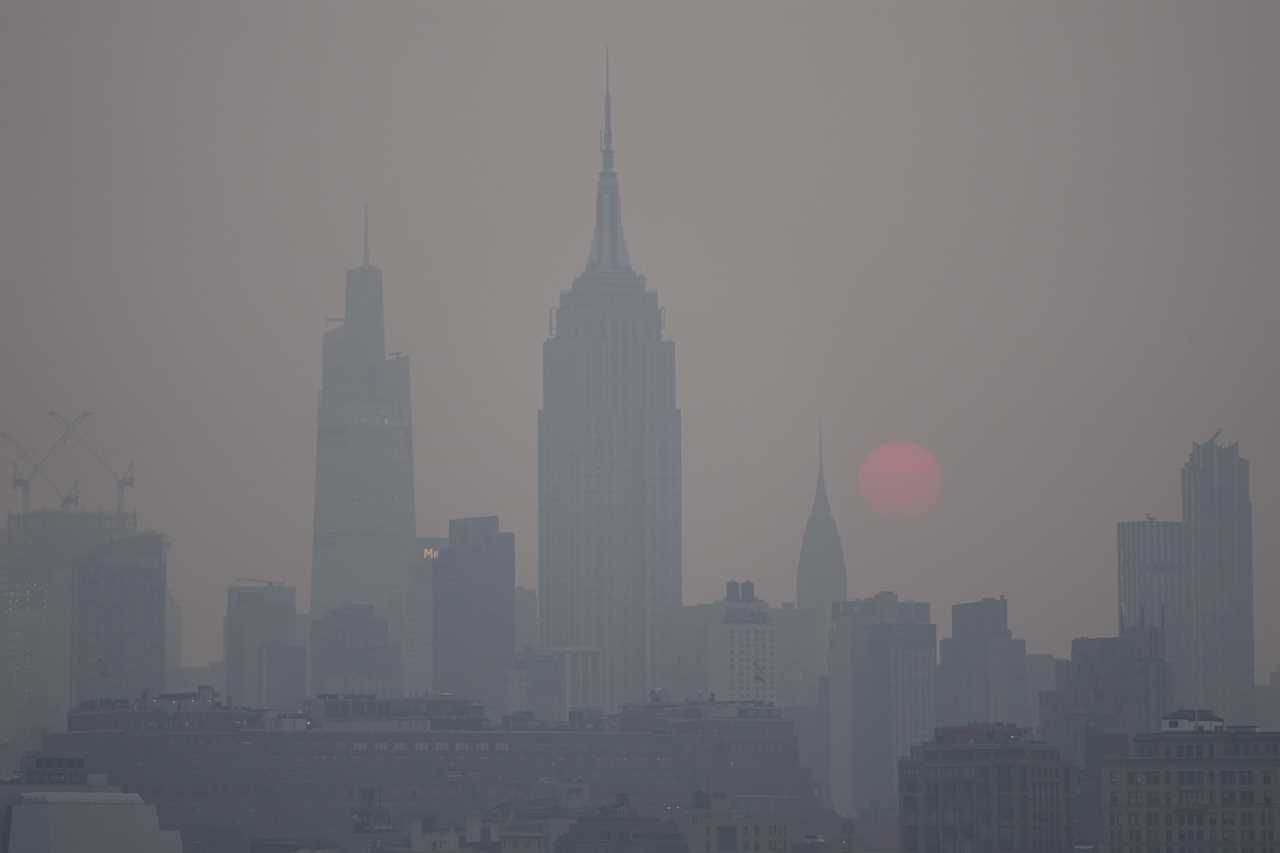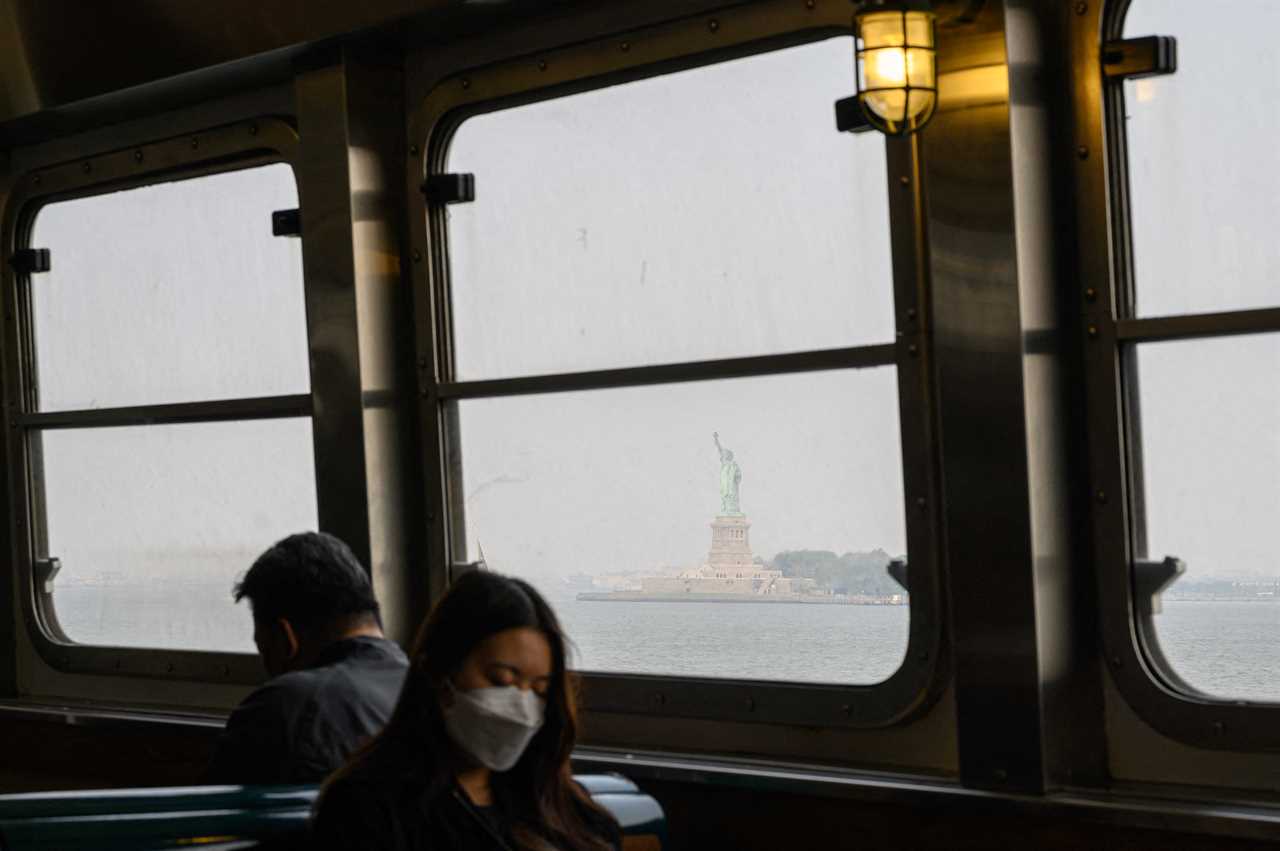
NEW YORK — A thick cloud of smoke from wildfires in Canada hung over New York City on Wednesday, causing an “unprecedented” decline in air quality that threatens public health as the effects of climate change become more pronounced, city officials said Wednesday.
New York had the worst pollution of any city in the world late Tuesday, with conditions starting to clear Wednesday morning. But officials warned that air quality could deteriorate again Wednesday afternoon before signs of possible improvement late Thursday. The situation is fluid and unpredictable, they said.
The multiple-day event shows how no city is immune from extreme weather events, even when they occur hundreds of miles away. Canada has 9 percent of the world’s forest, and this year’s wildfire season has occurred earlier than its usual July peak, said Zachary Iscol, commissioner of New York City Emergency Management. He said the number of fires and their intensity is also higher than usual.
“This may be the first time we’ve experienced something like this on this magnitude; let’s be clear, it’s not the last,” Mayor Eric Adams said at a Wednesday press briefing. “Climate change is accelerating these conditions. We must continue to draw down emissions, improve air quality and build resiliency.”
Residents should limit their outdoor activities, close their windows and use air purifiers if they own them, with the Bronx recording an Air Quality Index of 174 as of Wednesday morning, which is considered “unhealthy.”

Outdoor school activities in the city have been canceled, and medically vulnerable individuals are advised to wear a mask if they can’t stay indoors.
School districts outside of the city can make the determination to cancel outdoor activities, said a spokesperson for the State Education Department. Gov. Kathy Hochul said in a Wednesday statement that she recommends school districts cancel their outdoor activities.
While it’s normal in the summer for New York City to exceed an AQI level of 100 — which signifies the air is “unhealthy for sensitive groups” — it doesn’t typically exceed 150. Iscol said he isn’t aware the city has ever exceeded a reading of 200, which it did briefly Tuesday night.
New York City doesn’t currently have an “off the shelf” plan on actions it should take when it records poor air quality levels the way it has specific protocols ahead of hurricanes or other similar events, Iscol said. He said this week’s smoke-filled conditions have highlighted the need to develop actions that are triggered by different air quality measures.
“This is something that we could continue to see possibly over the next few months,” Iscol said, referring to the potential for more wildfires in Canada.
Adams defended his administration's response in the face of criticism that he didn't provide ample warning of the severe conditions. Adams released his first statement on the conditions late Tuesday, when New York's air quality was at its worst so far this week.
"What we should really try to prevent doing is to give any indication that this administration did not proactively respond and did not move in the right direction to let New Yorkers know," Adams said, adding that there were various alerts Tuesday and that the situation is "extremely fast moving."
Residents haven’t experienced such significant levels of city smog since the 1960s, before the federal Clean Air Act went into effect, said Ashwin Vasan, commissioner of the city Department of Health and Mental Hygiene.
He warned the fine particulate matter in the air could get into people’s lungs and cause inflammation and worsen conditions like asthma, chronic lung disease or underlying heart conditions. Older adults and children may be particularly vulnerable. There has not currently been an uptick in emergency room visits, he said.
“It is a reminder as the mayor has said, climate change is real, it is here,” Vasan said. “We are all connected in this global challenge and no one is spared.”
In New Jersey, Gov. Phil Murphy also urged people to stay inside and limit the amount of time outdoors. He also tied the fires to other extreme weather the state has been facing that are exacerbated by climate change. Already this year, wildfires have burned thousands of acres of the state.
“Make no mistake, from the wildfires in Canada to those cropping up with increasing frequency and severity in our own backyard, these extreme weather events are tangible — and devastating — evidence of the intensifying climate crisis,” he said.
Ry Rivard and Katelyn Cordero contributed to this report.
----------------------------------------
By: Danielle Muoio Dunn
Title: Climate change ‘is here': NY officials warn of health impacts from Canada wildfire smoke
Sourced From: www.politico.com/news/2023/06/07/wildfire-smoke-new-york-climate-change-00100754
Published Date: Wed, 07 Jun 2023 12:43:15 EST
Did you miss our previous article...
https://consumernewsnetwork.com/politics-us/white-house-is-watching-ukraines-counteroffensive-with-great-concern-as-the-war-and-bidens-reputation-are-at-stake






